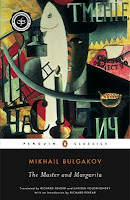The Best Book I Never Read
 Good literature expands the theological imagination, some say, but to be honest, I have been avoiding it for quite a while. With only a little time at the end of the day to read for pleasure, “real” literature is sometimes too dull to prop my eyelids up. So here is my scandalous confession:
Good literature expands the theological imagination, some say, but to be honest, I have been avoiding it for quite a while. With only a little time at the end of the day to read for pleasure, “real” literature is sometimes too dull to prop my eyelids up. So here is my scandalous confession:I am the worst read English-degree holding person in the world.
In my defense, my concentration was in critical theory, not literature, and I can only recount a novel or two that ever moved me. I once took a class about the American novel, 10 novels in one quarter, and I can’t remember a single book.
But this Christmas I was given The Master and Margarita and I resigned myself to reading it. My reasons were as follows:
1. honor my cousin who is so dear and generous with his gifts
2. have something to blog about after the holidays
3. fall asleep easily despite drinking too much coffee.
4. assuage my guilt in preferring theology and automotive books to literature.
-In that order. There’s a lot riding on Bulgakov.
And the result?
The Master and Margarita is quite simply one of the greatest novels I have ever read. It is genius and delight from beginning to middle, a laminated work that says many things at once to great effect. I haven’t finished it yet, but am already in love. Seriously. It may be my favorite book ever.
In The Master and Margarita, the Devil comes to Moscow as professor Woland and interjects himself in the midst of a conversation between a literary critic and a poet discussing the historical impossibility of Christ’s life. They of course do not realize they are speaking with the Devil. The novel then picks up the thread of Pilate’s personal anguish, narrating the trial of Jesus, finally pulling in Margarita’s love story, in which a deal is struck with the devil, Pilate is assuaged and the three narratives are brought together.
It is a story about the truth of things that the “system” cannot allow or account for. Bulgakov steeps the pages in a kind of humorous paranoia borne from a world where people disappear regularly, strangers are threats, and words are chosen very carefully for fear of the wrong people hearing. Sadly, it’s the same world I live in inside my own head, so perhaps it spoke to me too easily! It is witty and liberating satire in which freedom and truth enter from points outside allowable “truth.” The critic’s atheism is confronted by the seventh proof of God– experience- as he is run over by a train. The Master’s forsaken art leads to Pilate’s release, and Margarita’s illicit affections bring freedom through passion.
This is what is so compelling about the book. It is a story about what is true despite our inability to systematize and regulate it. Our present situation in the West today is not that of Communist Russia, but the authority of materialism and science in our thinking still reigns supreme despite its inability to account for all of life and truth. Reading this is a chance to experience the kind liberation Bulgakov points to, experiencing truth outside of spreadsheets and policies, enjoying the truth art and experience declare. This, I presume is the seventh proof.
I am taken with this book and just can’t recommend it enough. One note: avoid the Classic House version – it has so many typos and oddly phrased translations it reads like a Burroughs novel sometimes. Fortunately there are a lot of online resources to consult. Stick with known versions like Penguin’s. It is absolutely worth it, a true masterpiece.
Now back to Car & Driver.



great! i am intrigued to say the least... =)
ReplyDeleteI LOVE THIS BOOK. I will always be grateful to my Russian-obsessed English prof for this one.
ReplyDelete